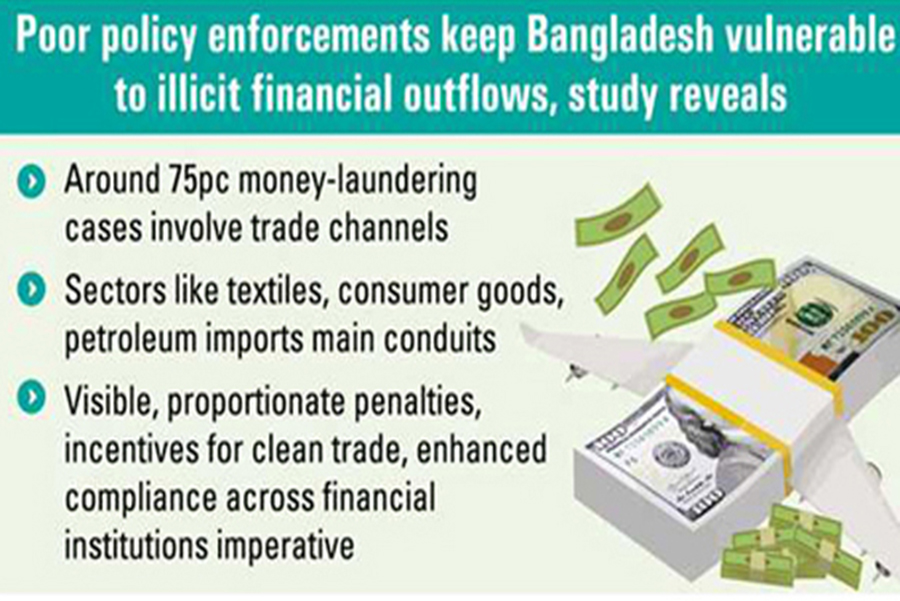
Published :
Updated :

Bangladesh loses US$16 billion annually through trade-based money laundering alone for policy leniency and lax regulation of trading operations, reveals an official outfit's study and prescribes preventives.

Despite having strong policy frameworks to help combat trade-based money laundering (TBML), the country remains significantly exposed to illicit financial outflows due to their inadequate enforcement and systemic challenges, says the study report published Tuesday by the Bangladesh Institute of Bank Management (BIBM).
The report, titled 'Enforcement Status of the Standards to Prevent Trade-Based Money Laundering', which was presented at a roundtable at the BIBM office, says approximately 75 per cent of domestic money- laundering cases involve trade channels.
Deputy Governor of Bangladesh Bank and Chairman of the BIBM Executive Committee Nurun Nahar was present at the programme as chief guest with BIBM Director-General S. M. Abdul Hakim in the chair.
Professor (Selection Grade) of BIBM Dr. Shah Md. Ahsan Habib presented the keynote while a good number of top bankers and experts also attended the event.
Over the period of past 15 years from 2009 to 2023, Bangladesh had lost an estimated amount of $16 billion annually through TBML, mostly in the sectors like textiles, consumer goods and petroleum imports.
Such outflow of money is equivalent to 3.4 per cent of the country's GDP, surpassing even the annual public health budget.
While Bangladesh has aligned its policies with global anti-money laundering standards--including risk-based customer due diligence, price-verification protocols, and real-time monitoring tools -- the implementation of the measures across the financial and customs systems remains inconsistent and, in many cases, ineffective.
Based on a combination of secondary research and a primary survey of 37 commercial banks, the BIBM study found all banks having claimed to have some form of sanctions-screening-and trade-monitoring systems.
However, only half of surveyed banks subscribe the global price- verification tools such as Bloomberg or Global Trade Tracker, mainly due to cost constraints.
Similarly, 90 per cent of banks report having vessel-tracking mechanisms but many do not utilise internationally reputed services like Lloyd's or the International Maritime Bureau.
Besides, while customer-risk scoring is applied universally, only 45 per cent of the banks have implemented enhanced due-diligence policies tailored specifically to trade-based clients.
Many banks rely on manual assessments without uniform benchmarks, leading to discrepancies in risk grading and inconsistent application of controls, it says.
The absence of dedicated price-verification units in most public banks and the use of subjective judgment by trade officers further complicate their enforcement.
The report mentions that TBML is not explicitly listed as a predicate offence in the Money Laundering Prevention Act 2012, although the law does provide for the prosecution and confiscation of assets linked to illicit financial flows through trade.
Recent updates to the BFIU's guidelines and the universally recognised national goAML platform have improved the reporting of TBML-linked suspicious transactions, but the overall detection rate still remains low.
A key concern highlighted in the study is a lack of integration and coordination among regulatory bodies, including the Bangladesh Financial Intelligence Unit (BFIU), the National Board of Revenue (NBR), customs authorities, and commercial banks.
"The disjointed systems prevent real-time sharing of trade, shipment, and payment data--an essential component in tracking phantom shipments, circular trades, and mispriced invoices," says the study report.
The BIBM analysis also points out a weak compliance culture within the banking sector.
Many institutions treat TBML controls as a box-ticking exercise rather than a core component of operational risk management, it says, stressing a shift in institutional mindset, where board-level leadership takes ownership of AML responsibilities and invests in staff training, trade analytics, and audit processes.
Global best practices--from countries such as Singapore, Chile, Finland and Sri Lanka--illustrate how integrated trade-and-payment data systems, beneficial ownership transparency, and structured public-private cooperation can strengthen TBML enforcement.
Such examples also demonstrate that visible and proportionate penalties, combined with incentives for clean trade, enhance compliance across financial institutions.
The report adds closing Bangladesh's TBML-enforcement gap is not merely a regulatory obligation but a development necessity.
Without urgent action, the country risks continued revenue loss, distorted trade data, and potentially damaging consequences such as FATF grey-listing, higher correspondent banking costs, and reputational harm in global markets.
Among the key recommendations are establishment of a national Trade Transparency Unit (TTU), the publication of a public beneficial ownership register, expanded use of dynamic price-benchmarking tools, and formalised information-sharing arrangements with regional trading partners.
The study findings indicate that Bangladesh's vulnerability to TBML remains both a governance and competitiveness challenge.
As the country pursues export-led growth and seeks to preserve its foreign-exchange buffers, improved enforcement of anti-TBML standards will be critical to sustaining economic integrity.
bdsmile@gmail.com


 For all latest news, follow The Financial Express Google News channel.
For all latest news, follow The Financial Express Google News channel.